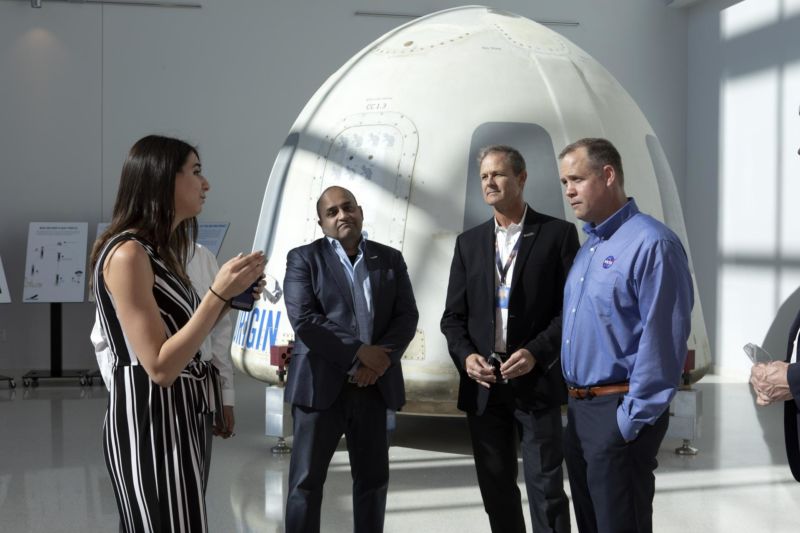
On Thursday, former US Speaker of the House Newt Gingrich expanded upon his ideas to use multi-billion-dollar prizes to accelerate the Trump administration's goal of sending humans to the Moon by 2024, and then Mars by the 2030s. He positioned the idea to promote commercial space as an alternative solution to NASA's current plans for using the Orion spacecraft and Space Launch System rocket.
"To be clear: Our proposal does not suggest cancelling any current proposal," Gingrich wrote. "It does suggest that for the cost of one—or at most two—SLS launches, it may be possible to incentivize a competition to land on and start developing the Moon in less time and for less money. It is based on the principle of paying only for the achievement. If no one is able to reach the Moon and begin developing it, then the taxpayer would not pay a cent."
The basic idea is that if SpaceX, Blue Origin, or another company were able to independently develop its own launch systems (like SpaceX's Starship or Blue Origin's New Glenn) and then land humans on the Moon, they would receive a payment of $2 billion or more for the achievement. This would offer a backup option if NASA's existing plans for the Artemis Program—which uses more traditional contracting and is expected to cost at least $30 billion—are delayed or run over budget.
In response to Gingrich's proposal, NASA Administrator Jim Bridenstine said he did not oppose the concept of prizes to further NASA's exploration aims.
“We, at NASA, are actively pursuing similar plans," he said. "My first initiative as NASA Administrator was the Commercial Lunar Payload Services program. It incentivizes the development of commercial delivery to the Moon and leverages the legacy companies of the Google Lunar X-Prize. CLPS could be scaled up and additional companies could be on-ramped for larger payloads."
In recent months, after Vice President Mike Pence charged NASA in March with landing a human on the Moon by 2024, Bridenstine has considered a number of different ideas and new ways of doing things. But the administrator also has to work with Congress, which writes NASA's budget. So he has been somewhat limited in his ability to implement radical changes like Gingrich—who has the ear of officials within the Trump White House—has proposed.
Pay on delivery
Earlier this year, Bridenstine said he did discuss "pay on delivery" contracts for large cargo missions to the Moon with companies such as SpaceX and Blue Origin. Ultimately, for this opportunity, he said they preferred the more standard "request for proposal" that was issued earlier this month. For "Gateway Logistics Services," NASA will pay up to $7 billion for multiple missions that deliver science, cargo, and supplies to a Lunar Gateway beginning in mid-2024 in advance of crew missions later that year. Along the way, the agency will provide "milestone" payments, similar to the contracts NASA used by SpaceX and Boeing for the Commercial Crew program to fly astronauts to the International Space Station.
However, Bridenstine is still very much interested in paying companies for services only upon delivery. "I am certainly happy to re-engage them on the idea that we seemingly all support," he explained.
SpaceX said it welcomes outcome-based programs that will help the agency lower its costs, and keep on the tight 2024 schedule for landing on the Moon. “It makes sense for NASA to look at the pros and cons of milestone payments versus a lump sum prize for a large cargo landing on the Moon—either would work for us," SpaceX President and Chief Operating Officer Gwynne Shotwell told Ars.
What seems clear is that this is a new era at NASA. This summer alone, in addition to the commercial Gateway Logistics supply program, NASA has awarded contracts to build two elements of the Lunar Gateway, bought three rides for small science payloads to the Moon from commercial companies, and allowed industry to propose their own ideas for how best to get astronauts down to the Moon from the Lunar Gateway. All of this is happening with "fixed-price" contracts, which pay companies for performance, rather than large award fees on top of costs.
The really powerful, traditional aerospace contractors accustomed to cost-plus contracts from the government, such as Boeing, Lockheed Martin, and Northrop Grumman still have a huge influence on the shape of space policy, especially through Congressional lobbying. But this summer Bridenstine has taken steps where he can to work with non-traditional partners if they have better solutions. He may not have fully embraced the X Prize concept, he seems to be tacking in that direction.
In short, he is taking Pence's advice when the vice president said in March, "I call on NASA to adopt new policies and embrace a new mindset. If our current contractors can't meet this objective, then we'll find ones that will."
https://arstechnica.com/science/2019/08/actually-nasa-is-looking-at-all-options-for-the-moon-including-prizes/Bagikan Berita Ini














0 Response to "Actually, NASA is looking at all options for the Moon—including prizes - Ars Technica"
Post a Comment